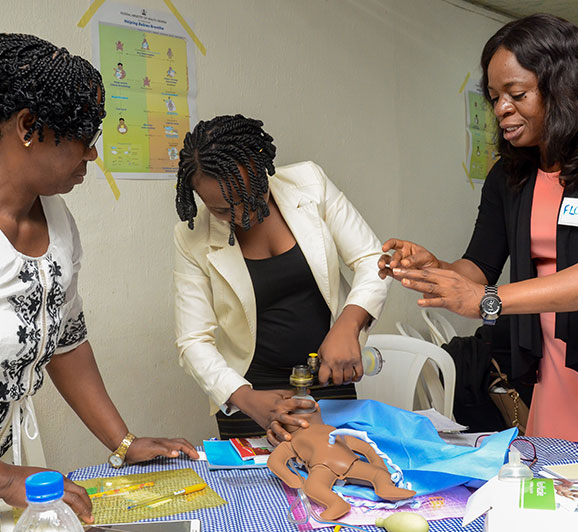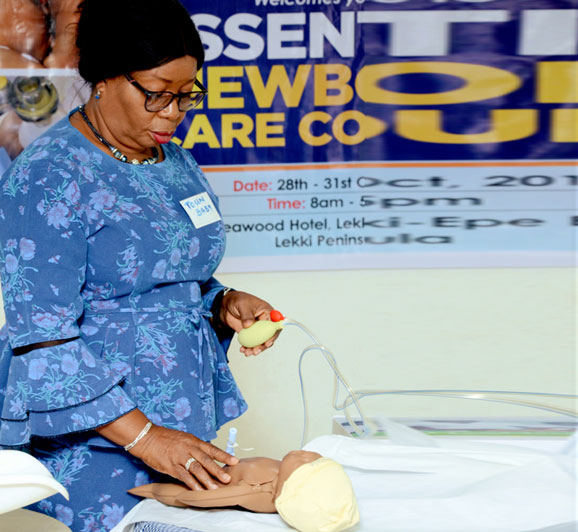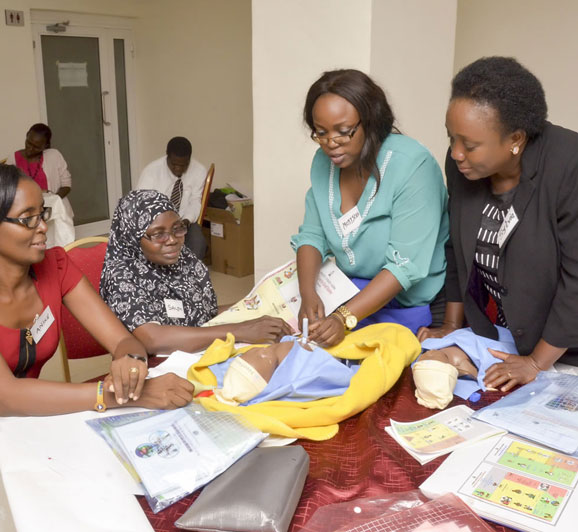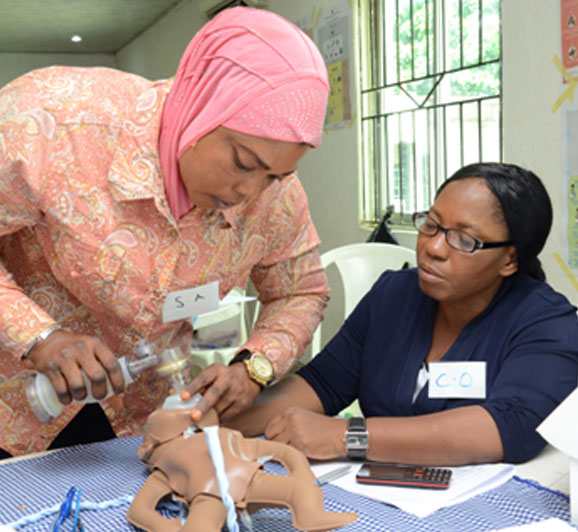
Helping Babies Breathe (HBB)
This was rolled-out in 2010 by the American Academy of Paediatrics in partnership with some United States government agencies and a few international NGOs. It is a simplified form of Neonatal Resuscitation Programme evidence-based curriculum that targets the frontline healthcare worker.
Its main teaching aids include the providers manual, action plan – an algorithm in green, yellow and red indicating, need for routine care, resuscitation and referral to advance care respectively. The practicals use inflated or water-filled dolls (neonatalies) which can be made to have a chest rise when ventilated, has device to elicit umbilical cord pulsation and crying device. This training can be adapted for on-the-job training as the time affords and could run for 6 hours to 2 days depending on the level of trainees and at the level of providers and facilitators. Its highlight is the Golden Minute – 60 seconds by which the baby is breathing or being helped to breathe with the ambu bag.
Donate
Essential Care for Small Babies(ECSB)
ECSB focuses on care of the well small baby. It also equips health care providers with skills and tools to make changes and improve care in their facilities. In this way providers can achieve better outcomes for babies and their mothers.
Donate
Essential Care for Every Baby(ECEB)
Presently, less than 20 per cent of health facilities offer emergency obstetric care and only 35 per cent of deliveries are attended by skilled birth attendants, according to UNICEF. ECEB is a new training program on essential newborn care based on latest WHO guidelines. Developed by the American Academy of Pediatrics, the curriculum begins after birth throughout the first day of the newborn’s life, until the time of discharge.AMCH also supports the following trainings and initiatives:
- Newborn Resuscitation Training (NRT)
- Emergency Obstetric Care (EmOC)
- Early Infant Diagnosis (EID)
- Infant and Child Feeding
- Support Sickle Cell Club
- Prevention of Mother to Child Transmission

Neonatal Resuscitation Training (NRT)
Neonatal Resuscitation Training has been domesticated from the Neonatal Resuscitaion Programme of the American Academy of Paediatrics and American Heart Association. The same manuals are used but local adaptation where necessary is made to address our own complexities. It is a two-day course – teaching the basic physiology of respiration and cardiopulmonary function with both didactic lectures and practicals. It is mainly hands-on and skills such as ventilation with bag and mask as well as chest compression and intubation are taught. Trainees are assessed with both MCQs and OSCEs.
Donate
Essential Newborn Care Course(ENCC)
This training. Otherwise known as Helping Babies Survive by the American Academy of Paediatrics was adapted from a comprehensive WHO manual on essential care of the newborn at birth, postnatal and beyond. This curriculum is an up-to-date, evidence-based standard of care meant to equip the frontline health-care worker with appropriate knowledge and skill to render high quality care addressing the common causes of Newborn deaths namely, breathing problems at birth, prematurity and infection. Also teaches early recognition of danger signs. The Federal Ministry of Health recently adopted and adapted the curriculum as Essential Newborn Care Course (ENCC) comprising four modules which is being propagated nationally.
- CFS-Communication/ Facilitation Skills
- HBB- Helping Baby Breath
- ECEB- Essential Care for Every Baby
- ECSB- Essential Care for Small Babies.

